外研版必修1 Module 1 My First Day at Senior High课件(30张ppt)
文档属性
| 名称 | 外研版必修1 Module 1 My First Day at Senior High课件(30张ppt) |
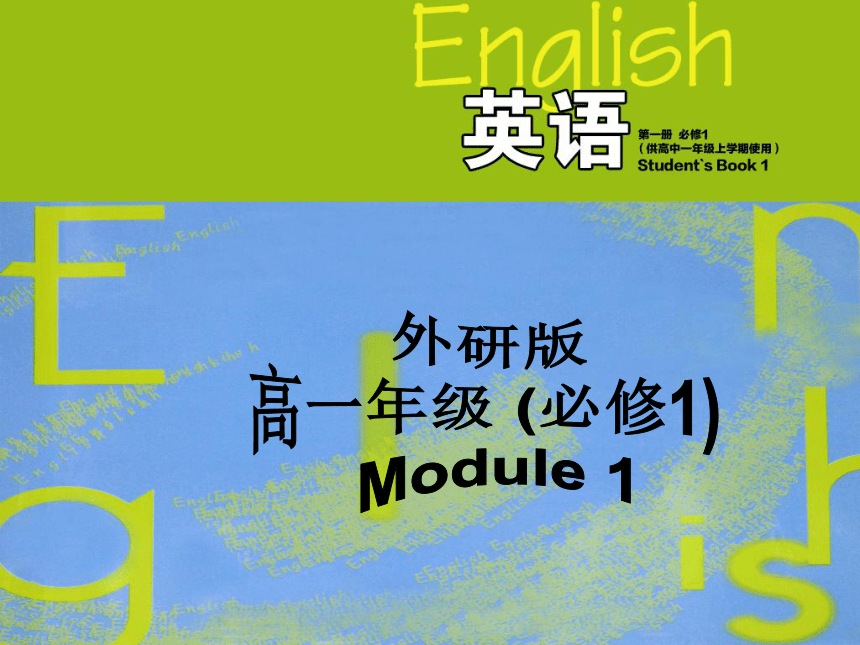
|
|
| 格式 | zip | ||
| 文件大小 | 1.6MB | ||
| 资源类型 | 教案 | ||
| 版本资源 | 外研版 | ||
| 科目 | 英语 | ||
| 更新时间 | 2022-01-25 15:55:32 | ||
图片预览

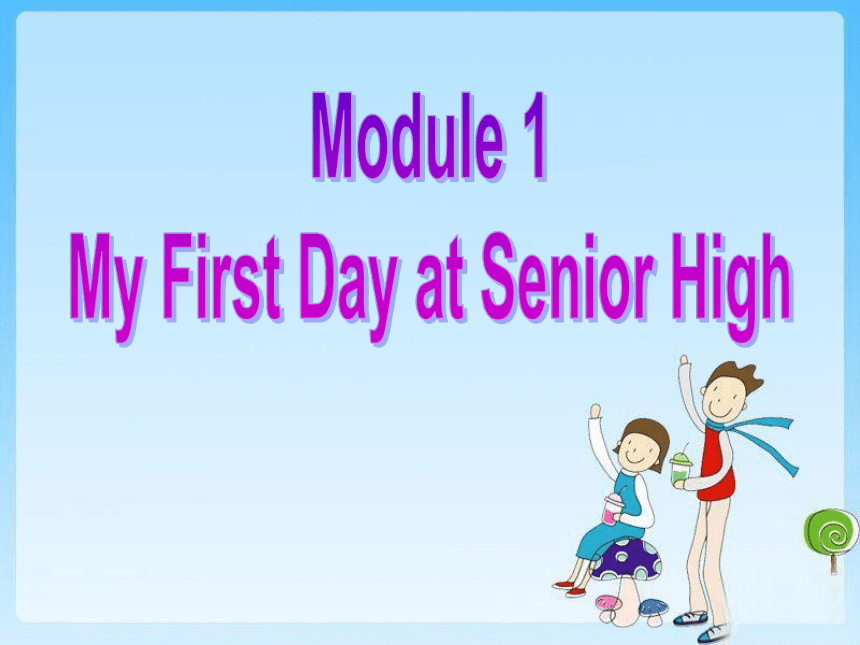

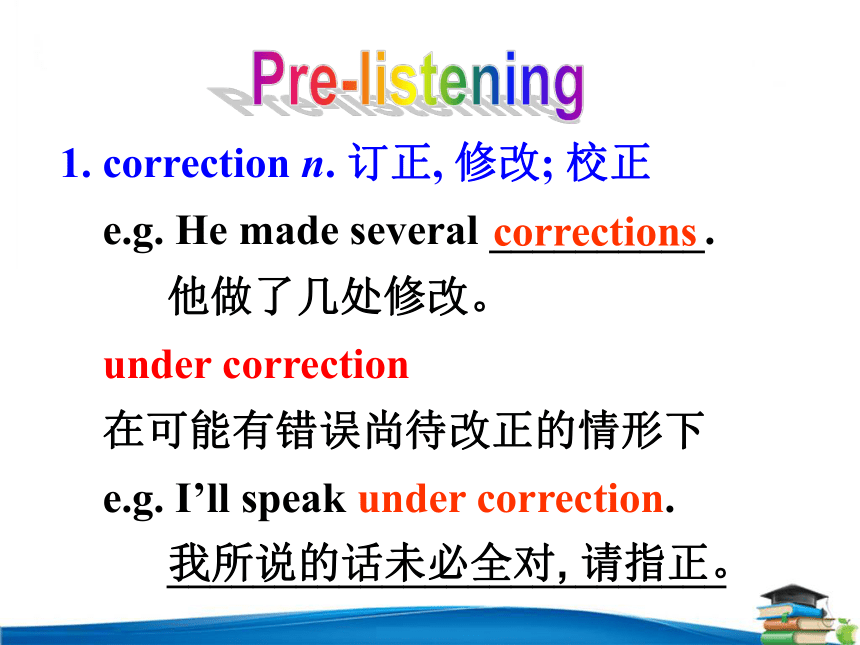
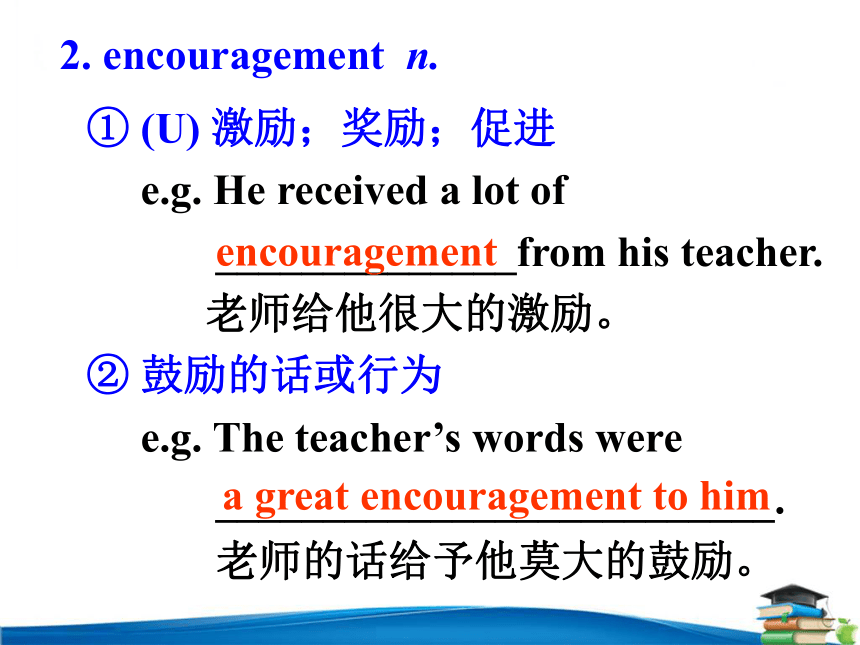
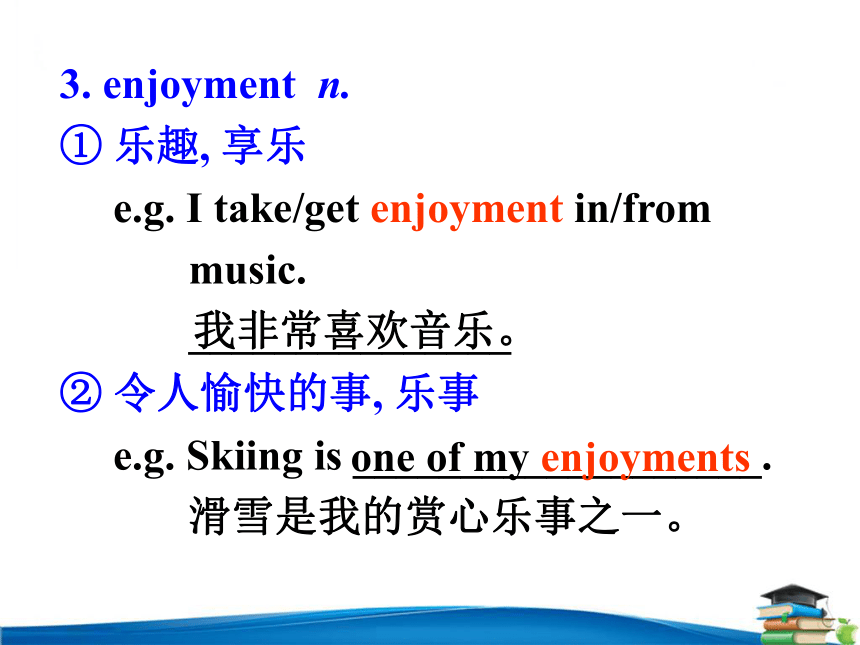
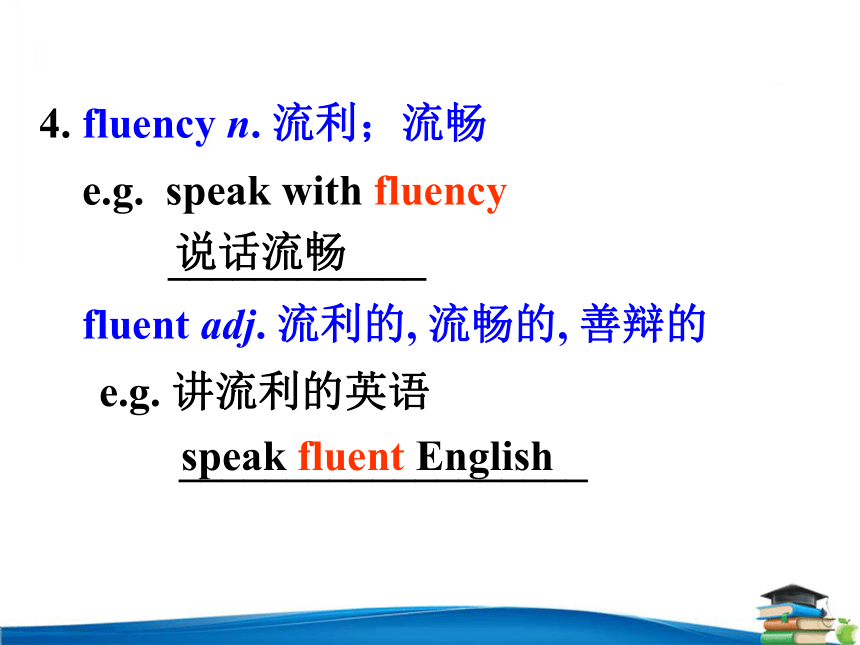
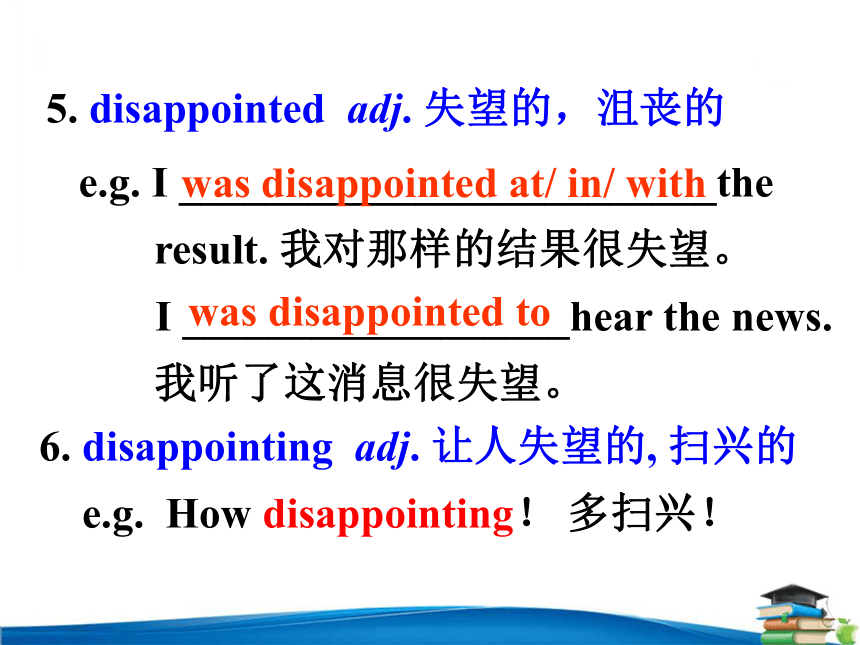
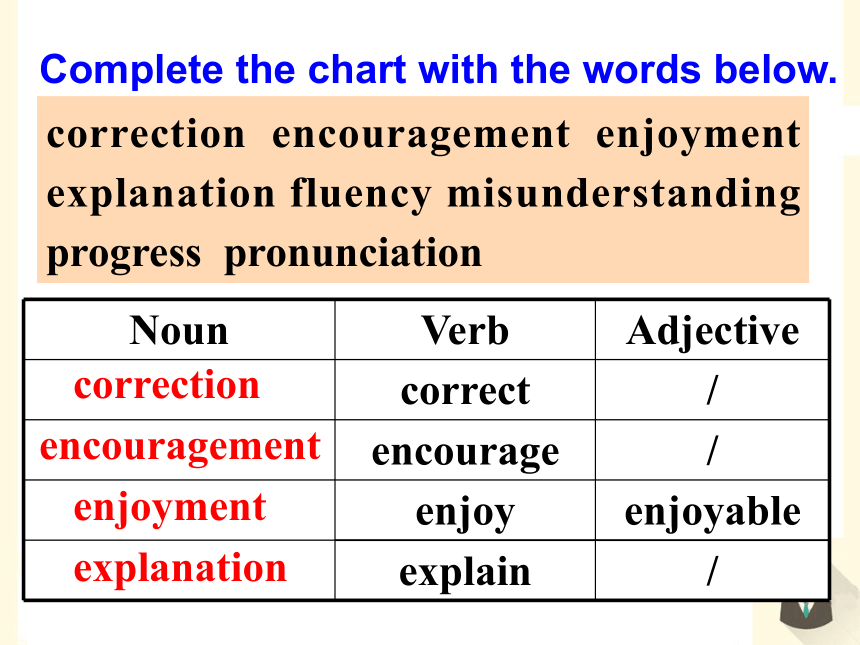
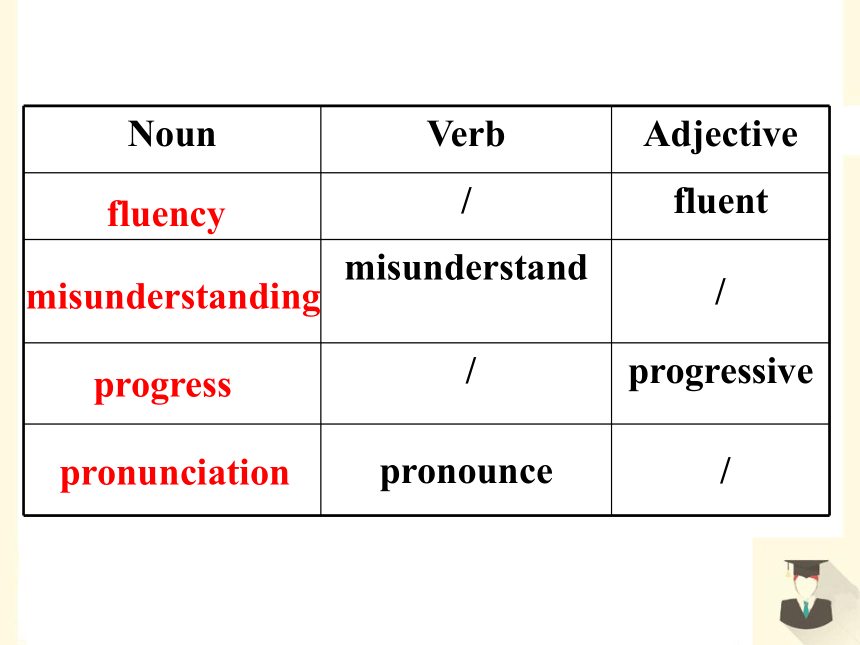
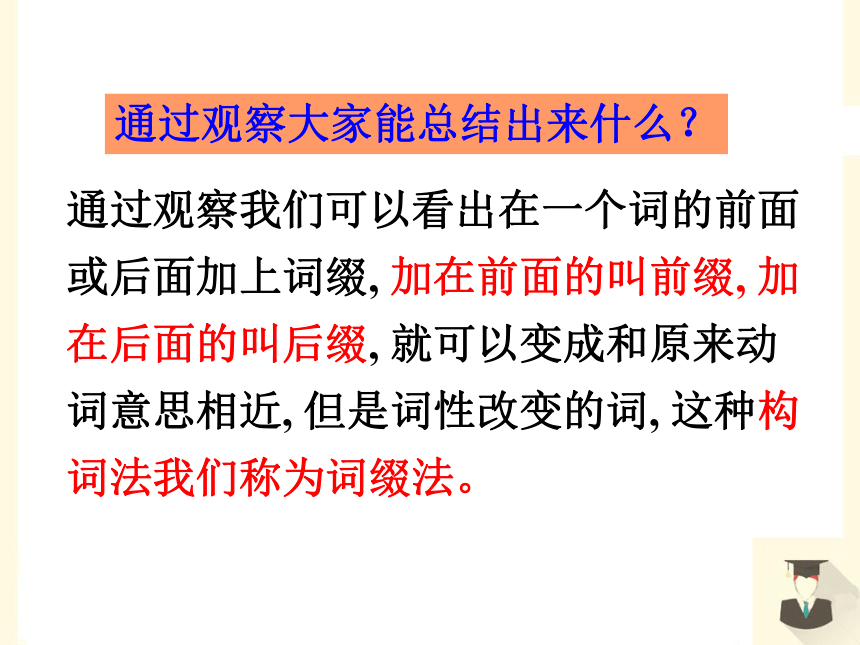
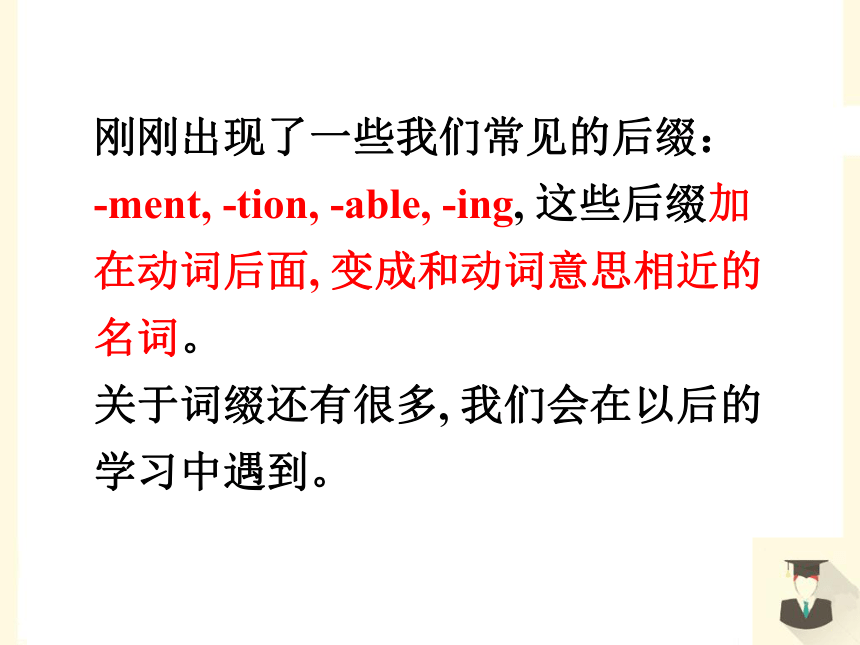
文档简介
(共30张PPT)
1. correction n. 订正, 修改; 校正
e.g. He made several __________.
他做了几处修改。
under correction 在可能有错误尚待改正的情形下
e.g. I’ll speak under correction.
__________________________
corrections
我所说的话未必全对, 请指正。
2. encouragement n.
① (U) 激励;奖励;促进
e.g. He received a lot of
______________from his teacher.
老师给他很大的激励。
② 鼓励的话或行为
e.g. The teacher’s words were
__________________________.
老师的话给予他莫大的鼓励。
encouragement
a great encouragement to him
3. enjoyment n.
① 乐趣, 享乐
e.g. I take/get enjoyment in/from
music.
_______________
② 令人愉快的事, 乐事
e.g. Skiing is ___________________.
滑雪是我的赏心乐事之一。
我非常喜欢音乐。
one of my enjoyments
4. fluency n. 流利;流畅
e.g. speak with fluency
____________
fluent adj. 流利的, 流畅的, 善辩的
e.g. 讲流利的英语
___________________
说话流畅
speak fluent English
5. disappointed adj. 失望的,沮丧的
e.g. I _________________________the
result. 我对那样的结果很失望。
I __________________hear the news.
我听了这消息很失望。
6. disappointing adj. 让人失望的, 扫兴的
e.g. How disappointing! 多扫兴!
was disappointed at/ in/ with
was disappointed to
Noun Verb Adjective
correct /
encourage /
enjoy enjoyable
explain /
correction
encouragement
enjoyment
explanation
Complete the chart with the words below.
correction encouragement enjoyment
explanation fluency misunderstanding
progress pronunciation
Noun Verb Adjective
/ fluent
misunderstand /
/ progressive
pronounce /
misunderstanding
progress
pronunciation
fluency
通过观察我们可以看出在一个词的前面或后面加上词缀, 加在前面的叫前缀, 加在后面的叫后缀, 就可以变成和原来动词意思相近, 但是词性改变的词, 这种构词法我们称为词缀法。
通过观察大家能总结出来什么?
刚刚出现了一些我们常见的后缀:
-ment, -tion, -able, -ing, 这些后缀加在动词后面, 变成和动词意思相近的名词。
关于词缀还有很多, 我们会在以后的学习中遇到。
Complete these sentences. Use a suitable form of each word in the box. You can do it with your partners.
1. He isn’t Chinese, but he’s ______ in Chinese.
2. The first lesson was very _________ ─ I liked it a lot!
fluent
enjoyable
3. Mr Davies gave us a lot of ____________ ─ he made us feel really good about being there.
4. I think we all made a lot of _________ ─ in just an hour!
5. The most important thing at the beginning is _____________, getting the sounds right.
progress
pronunciation
encouragement
6. He had an interesting attitude to _________ ─he said it didn’t matter if we made mistakes.
7. I _____________ the teacher ─I thought the class was for people who already speak Spanish.
8. I was a bit disappointed ─ she ________ everything in English.
misunderstood
explained
correction
Listen to the tape for the first time and answer the following questions.
Reminding: When you listen to the tape for the first time, you should try to get the main idea.
1. What do you think the students are doing
They’re talking about a Chinese lesson that they both attended.
B. They’re talking about a Chinese lesson that one of them attended.
C. They’re talking about different language lessons that they attended.
2. What do you think about the lessons they attended
A. They were both happy with their lessons.
B. They were both disappointed with their lessons.
C. One was happy but the other was disappointed.
Listen again and answer these questions.
Reminding: When you listen to the tape for the second time, you should try to get the details.
1. Is Diane studying Chinese
No, she isn’t. She’s studying Spanish.
2. Is Rob’s teacher a native speaker of Chinese
No, he isn’t, but he’s fluent in Chinese.
3. Is the assistant teacher a native speaker
Yes, she is. Her name’s Miss Wang.
4. Did the Chinese teacher encourage the students
Yes, he did. He made them feel really good.
5. Did he give the students anything to read
No, he didn’t. He said pronunciation was the most important thing at the beginning.
6. Did Diane understand the level of the class she went to
No, she didn’t. She thought it was for speakers of Spanish.
7. Was Rob disappointed with his first lesson
No, he wasn’t. He made a lot of progress.
8. Was Diane excited about her first lesson
No, she wasn’t. She was disappointed.
Read the part of the conversation between Rob and Diane. Look for the expressions they use to keep the conversation going and underline them.
Rob: Hi, Diane!
Diane: Hi, Rob! How are you doing
Rob: I’m fine. I’ve just been to my first language class.
Diane: Oh really So have I.
Rob: Really Which language are you studying
Diane: Spanish. Which language are
YOU studying
Rob: Chinese.
Diane: Is that right Cool! How was it
Rob: It was good. The teacher’s name
is Mr Davies.
Diane: Mr Davies
Rob: Yes, he isn’t Chinese, obviously, but he’s fluent in Chinese. And there’s an assistant teacher called Miss Wang. She IS Chinese. We’re going to see her once a week.
Diane: And what do you think
双方对话的发展是靠相互提问进行下去的。
Preview
Preview PRONUNCIATION -ed endings,
SPEAKING offering your answers and
WRITING reading carefully.
Listen to the conversation again and recite the key words.
Summary the regulation of affixation and conversion.
1. correction n. 订正, 修改; 校正
e.g. He made several __________.
他做了几处修改。
under correction 在可能有错误尚待改正的情形下
e.g. I’ll speak under correction.
__________________________
corrections
我所说的话未必全对, 请指正。
2. encouragement n.
① (U) 激励;奖励;促进
e.g. He received a lot of
______________from his teacher.
老师给他很大的激励。
② 鼓励的话或行为
e.g. The teacher’s words were
__________________________.
老师的话给予他莫大的鼓励。
encouragement
a great encouragement to him
3. enjoyment n.
① 乐趣, 享乐
e.g. I take/get enjoyment in/from
music.
_______________
② 令人愉快的事, 乐事
e.g. Skiing is ___________________.
滑雪是我的赏心乐事之一。
我非常喜欢音乐。
one of my enjoyments
4. fluency n. 流利;流畅
e.g. speak with fluency
____________
fluent adj. 流利的, 流畅的, 善辩的
e.g. 讲流利的英语
___________________
说话流畅
speak fluent English
5. disappointed adj. 失望的,沮丧的
e.g. I _________________________the
result. 我对那样的结果很失望。
I __________________hear the news.
我听了这消息很失望。
6. disappointing adj. 让人失望的, 扫兴的
e.g. How disappointing! 多扫兴!
was disappointed at/ in/ with
was disappointed to
Noun Verb Adjective
correct /
encourage /
enjoy enjoyable
explain /
correction
encouragement
enjoyment
explanation
Complete the chart with the words below.
correction encouragement enjoyment
explanation fluency misunderstanding
progress pronunciation
Noun Verb Adjective
/ fluent
misunderstand /
/ progressive
pronounce /
misunderstanding
progress
pronunciation
fluency
通过观察我们可以看出在一个词的前面或后面加上词缀, 加在前面的叫前缀, 加在后面的叫后缀, 就可以变成和原来动词意思相近, 但是词性改变的词, 这种构词法我们称为词缀法。
通过观察大家能总结出来什么?
刚刚出现了一些我们常见的后缀:
-ment, -tion, -able, -ing, 这些后缀加在动词后面, 变成和动词意思相近的名词。
关于词缀还有很多, 我们会在以后的学习中遇到。
Complete these sentences. Use a suitable form of each word in the box. You can do it with your partners.
1. He isn’t Chinese, but he’s ______ in Chinese.
2. The first lesson was very _________ ─ I liked it a lot!
fluent
enjoyable
3. Mr Davies gave us a lot of ____________ ─ he made us feel really good about being there.
4. I think we all made a lot of _________ ─ in just an hour!
5. The most important thing at the beginning is _____________, getting the sounds right.
progress
pronunciation
encouragement
6. He had an interesting attitude to _________ ─he said it didn’t matter if we made mistakes.
7. I _____________ the teacher ─I thought the class was for people who already speak Spanish.
8. I was a bit disappointed ─ she ________ everything in English.
misunderstood
explained
correction
Listen to the tape for the first time and answer the following questions.
Reminding: When you listen to the tape for the first time, you should try to get the main idea.
1. What do you think the students are doing
They’re talking about a Chinese lesson that they both attended.
B. They’re talking about a Chinese lesson that one of them attended.
C. They’re talking about different language lessons that they attended.
2. What do you think about the lessons they attended
A. They were both happy with their lessons.
B. They were both disappointed with their lessons.
C. One was happy but the other was disappointed.
Listen again and answer these questions.
Reminding: When you listen to the tape for the second time, you should try to get the details.
1. Is Diane studying Chinese
No, she isn’t. She’s studying Spanish.
2. Is Rob’s teacher a native speaker of Chinese
No, he isn’t, but he’s fluent in Chinese.
3. Is the assistant teacher a native speaker
Yes, she is. Her name’s Miss Wang.
4. Did the Chinese teacher encourage the students
Yes, he did. He made them feel really good.
5. Did he give the students anything to read
No, he didn’t. He said pronunciation was the most important thing at the beginning.
6. Did Diane understand the level of the class she went to
No, she didn’t. She thought it was for speakers of Spanish.
7. Was Rob disappointed with his first lesson
No, he wasn’t. He made a lot of progress.
8. Was Diane excited about her first lesson
No, she wasn’t. She was disappointed.
Read the part of the conversation between Rob and Diane. Look for the expressions they use to keep the conversation going and underline them.
Rob: Hi, Diane!
Diane: Hi, Rob! How are you doing
Rob: I’m fine. I’ve just been to my first language class.
Diane: Oh really So have I.
Rob: Really Which language are you studying
Diane: Spanish. Which language are
YOU studying
Rob: Chinese.
Diane: Is that right Cool! How was it
Rob: It was good. The teacher’s name
is Mr Davies.
Diane: Mr Davies
Rob: Yes, he isn’t Chinese, obviously, but he’s fluent in Chinese. And there’s an assistant teacher called Miss Wang. She IS Chinese. We’re going to see her once a week.
Diane: And what do you think
双方对话的发展是靠相互提问进行下去的。
Preview
Preview PRONUNCIATION -ed endings,
SPEAKING offering your answers and
WRITING reading carefully.
Listen to the conversation again and recite the key words.
Summary the regulation of affixation and conversion.
